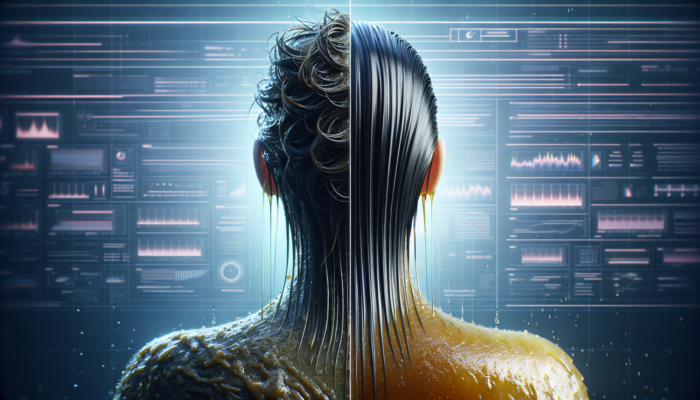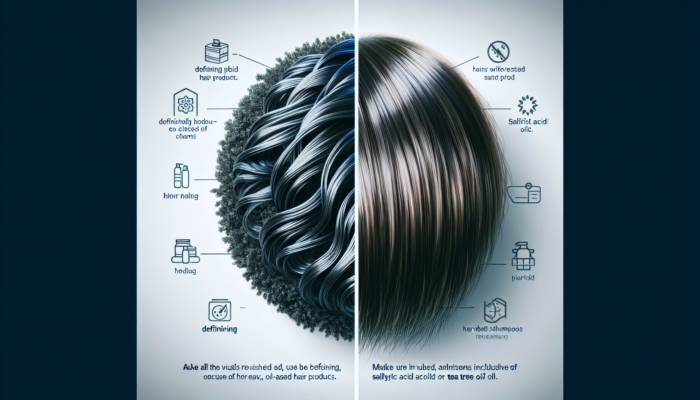Understanding the Key Factors Behind Greasy Hair: Causes and Solutions
To effectively manage and treat greasy hair, it's essential to gain a thorough understanding of its primary causes. The oiliness of hair can result from a variety of factors, ranging from biological elements to personal lifestyle choices. By exploring these underlying causes in depth, you can develop targeted strategies that encourage healthier and fresher-looking hair. This leads to locks that not only appear vibrant but also feel rejuvenated and full of vitality.
How Overactive Sebaceous Glands Affect Your Hair's Oiliness

The most significant contributor to greasy hair is often linked to the hyperactivity of the sebaceous glands. These glands, located in the hair follicles, secrete sebum, a natural oily substance that moisturizes and protects both the scalp and hair. While sebum plays a vital role in maintaining hair health, an excess of this oil can give hair a heavy, greasy appearance that can be difficult to manage.
Multiple factors can lead to increased sebaceous gland activity. For example, hormonal fluctuations during puberty or menstrual cycles often lead to heightened oil production. Additionally, psychological stressors such as anxiety can exacerbate this condition, causing the body to produce even more sebum. Certain medications, especially those that affect hormone levels, may also contribute to excessive oiliness. Understanding these triggers is crucial for effective management of greasy hair.
To mitigate the effects of overactive sebaceous glands, establishing a customized hair care routine is essential. This should include choosing shampoos specifically formulated for oily hair, which can help regulate oil production without stripping away the essential moisture your hair needs. Regular cleansing, ideally every other day, will help prevent the buildup that contributes to a greasy appearance.
Understanding the Effects of Hormonal Imbalances on Hair Oil Production
Hormonal imbalances can significantly influence the production of greasy hair. Fluctuations in hormone levels, especially androgens, often lead to increased sebum secretion in the scalp. Various life stages, including puberty, menstruation, pregnancy, and menopause, are periods when hormonal changes can manifest in increased oiliness of hair.
During puberty, for instance, the body experiences a surge in hormones that activates sebaceous glands, leading to noticeable oiliness. Women may also observe changes in hair oiliness throughout their menstrual cycle due to varying estrogen and progesterone levels. Pregnancy introduces profound hormonal shifts that can affect the scalp and hair, often resulting in heightened oiliness. In menopause, a decline in estrogen levels can change both hair texture and oil production.
Addressing hormonal imbalances effectively may require a multifaceted approach. Engaging with a healthcare professional can provide insights on potential treatments. Additionally, lifestyle changes such as adopting a balanced diet and implementing stress-reduction techniques can help stabilize hormone levels, thus reducing hair greasiness.
How Genetics Influence Hair Oiliness: The Role of Inherited Traits
Genetics play a significant role in determining the likelihood of experiencing greasy hair. If your family has a history of oily hair, it's likely that you may face similar challenges. The size and activity of sebaceous glands are traits that can be inherited, indicating that some individuals are naturally more prone to oiliness than others.
Inherited factors dictate both the volume of oil produced and how your scalp responds to various stimuli, including dietary habits, stress, and environmental conditions. For example, individuals with larger or more active sebaceous glands may frequently struggle with greasiness.
While it's impossible to change your genetic makeup, understanding your predisposition can help you formulate effective strategies for managing greasy hair. Tailoring your hair care routine to fit your unique needs can yield improved results. Opt for lightweight products specifically designed for oily hair and consider incorporating clarifying treatments to effectively eliminate excess oil and buildup.
Identifying Daily Routines That Contribute to Greasy Hair

Your daily habits play a crucial role in the oiliness of your hair. From how frequently you touch your hair to the types of products you apply, these seemingly minor actions can significantly affect the appearance and health of grease. Understanding these habits is essential for effectively managing your hair's health and appearance.
The Hidden Impact of Hair Touching on Oil Levels
One of the most underestimated factors contributing to greasy hair is the frequent act of touching your hair. Each time you run your fingers through your locks, you unwittingly transfer oils from your hands to your hair, which exacerbates oiliness and can lead to a buildup of dirt and debris, complicating matters even further.
To alleviate this issue, it’s important to develop an awareness of your habits. If you notice yourself frequently playing with your hair, make a conscious effort to break this habit. Consider tying your hair back or using accessories that keep your hands away from it. Additionally, maintaining clean hands can minimize oil transfer, so remember to wash your hands regularly and reduce unnecessary contact with your face or hair.
By curtailing this habit, you can significantly lessen your hair's oiliness, allowing it to appear fresh for extended periods. Remember, even minor changes in your daily routine can lead to significant improvements in your hair's overall appearance.
How Dietary Choices Affect Your Hair's Oiliness
Your dietary habits play an essential role in your hair's health, influencing not only its appearance but also its tendency to become oily. Consuming foods high in fats and sugars can stimulate your sebaceous glands, resulting in increased oil production and, ultimately, greasy hair.
Incorporating a balanced diet rich in essential vitamins and minerals can help regulate oil production. Focus on consuming whole foods, including a variety of fruits, vegetables, lean proteins, and healthy fats. Omega-3 fatty acids, found in fish and nuts, are particularly beneficial for supporting scalp health and can help maintain balanced oil production.
Furthermore, staying hydrated is critical. Water plays a vital role in flushing out toxins and maintaining a balanced environment for your scalp. Aim to drink at least eight glasses of water daily, and consider limiting your intake of processed foods and sugary snacks, which can exacerbate oiliness. By making conscious dietary choices, you can significantly enhance the condition of your hair, ensuring it remains clean and vibrant.
The Detrimental Effects of Using Inappropriate Hair Products

Utilizing unsuitable hair products can significantly exacerbate the problem of greasy hair. Heavy or oil-based products tend to weigh hair down, making it feel greasier more quickly than it should. It’s critical to select products specifically designed for oily hair, as these will help manage excess oil while maintaining the necessary moisture balance in your locks.
When choosing shampoos and conditioners, look for lightweight formulations containing clarifying ingredients. Avoid products that have heavy silicones, oils, and waxes, which can lead to buildup over time. Instead, opt for ingredients such as salicylic acid or tea tree oil, known for their oil-reducing properties and effectiveness in combating greasiness.
Moreover, exercise caution with styling products. Gels, pomades, and certain mousses can contribute to greasiness if they contain heavy oils. If you need to use styling products, choose those labeled as “lightweight” or “oil-free.” Regularly reassess your product choices, as your hair's needs may change due to environmental factors, seasonal shifts, or hormonal fluctuations.
Mastering Hair Washing Techniques for Greasy Hair Management
The techniques you use for washing your hair are crucial in managing greasy hair. Understanding how often to wash your hair, which products to choose, and how to rinse effectively can lead to significant improvements in maintaining a clean and healthy scalp.
Determining the Ideal Washing Frequency for Oily Hair
Finding the right balance for washing greasy hair is essential. While the temptation may exist to wash your hair daily to combat greasiness, over-washing can strip the scalp of its natural oils, leading to a rebound effect where the scalp produces even more oil in response. Aim to wash your hair every other day or every third day, depending on your specific hair type and oiliness level.
If you have particularly oily hair, consider using a gentle clarifying shampoo weekly to remove buildup without compromising the essential moisture your hair requires. On days when you aren't washing, incorporating dry shampoo can help absorb excess oil and refresh your hair, allowing you to extend the time between washes.
Pay attention to how your hair reacts to your washing routine. If you notice an increase in greasiness, it may be time to adjust your washing frequency or the products you use. Finding the right routine often requires patience and experimentation, so be open to trying different approaches.
Selecting the Most Effective Shampoos for Oily Hair Management
Choosing the right shampoo can greatly influence your ability to manage greasy hair. Look for formulations specifically intended for oily hair, as these typically contain ingredients that effectively control excess oil production. Ingredients like salicylic acid, clay, and tea tree oil are particularly beneficial in combating greasiness and promoting a healthier scalp environment.
Avoid shampoos with heavy silicones or oils, as these can worsen oiliness. Instead, choose lightweight, clarifying shampoos that cleanse the scalp without causing irritation or excessive dryness. Ingredients like menthol can provide a refreshing sensation while helping to manage oil levels.
In addition to selecting the right shampoo, consider alternating between different products to prevent your scalp from becoming accustomed to a single formula. This strategy can help maintain effectiveness and keep your hair from becoming greasy again.
Perfecting Rinsing Techniques to Minimize Greasiness
Effective rinsing is a vital step in managing greasy hair. Many individuals underestimate the importance of thoroughly rinsing out shampoo and conditioner, which can lead to residue buildup that contributes to an oily appearance.
When rinsing your hair, ensure that all products are completely washed out. Focus particularly on the scalp, where residue is likely to accumulate. A comprehensive rinse helps prevent greasiness and keeps your hair and scalp healthy, free from buildup.
Consider finishing your washing routine with a cool water rinse. Cool water helps to close the hair cuticles, enhancing shine and health while reducing oil production. By incorporating proper rinsing techniques into your routine, you can maintain your hair's freshness for longer periods.
Expert Styling Techniques to Manage Greasy Hair Effectively
Styling can be quite challenging when dealing with greasy hair, but with the right techniques, you can create styles that effectively disguise oiliness while enhancing your overall appearance. From innovative hairstyles to strategic product use, numerous strategies are available for you to explore.
Creative Hairstyles That Conceal Greasy Roots
When faced with greasy hair, opting for hairstyles that effectively hide oily roots can completely transform your look. Updos, braids, and other creative styles can help divert attention from an oily scalp while ensuring your hair appears stylish and well-groomed.
Consider styling your hair back into a sleek bun or ponytail. These hairstyles keep your hair off your face, creating a polished look that minimizes the visibility of greasiness. Braiding your hair can also be an excellent alternative, adding texture while helping to disguise any oiliness at the roots.
Accessories like headbands or scarves can elevate your hairstyle while camouflaging greasy roots. These elements can add flair to your look while also helping to absorb excess oil. By experimenting with various styles and techniques, you can find what works best for you while managing the challenges of oily hair.
Maximizing the Benefits of Dry Shampoo for Oily Hair
Dry shampoo can be a game-changer for managing greasy hair effectively. This product absorbs excess oil, giving your hair a refreshed look without requiring a full wash. However, proper application is crucial to achieving the best results.
Begin with dry hair, sectioning it to ensure even application. Hold the dry shampoo a few inches away from your scalp and spray it directly onto the roots. Allow it to sit for a few minutes to absorb the oil before massaging it into your scalp with your fingers. This process helps distribute the product evenly and eliminates any residual buildup.
Choosing the right dry shampoo is equally important. Look for lightweight formulations free from heavy fragrances or talc, which can leave a white residue in your hair. Instead, opt for products containing natural ingredients like rice or tapioca starch, which can provide a more seamless look. With effective dry shampoo use, you can prolong the time between washes and maintain your hair's fresh and vibrant appearance.
Quick Fixes for Last-Minute Greasy Hair Emergencies
There may be times when you find yourself dealing with greasy hair and limited time to spare. Fortunately, several quick solutions can help restore your hair's freshness in no time. One popular option is baby powder or cornstarch, which can effectively absorb excess oil and deliver a matte finish.
Simply sprinkle a small amount onto your roots and massage it through your hair for even distribution. This technique can quickly reduce the appearance of grease and give your hair a revitalized look. If you don’t have baby powder or cornstarch on hand, consider using blotting papers, typically designed for facial oil absorption, to dab away excess oil at the roots.
Another quick fix involves using a stylish hairband or accessory that diverts attention from the roots. A fashionable hat or headscarf can also work wonders in a pinch, allowing you to conceal greasiness while maintaining a trendy appearance. These simple solutions can help you appear polished and put-together, even when you're short on time.
Natural Remedies for Effective Greasy Hair Management
Exploring natural remedies can be a highly effective strategy for those seeking to manage greasy hair without relying heavily on commercial products. From apple cider vinegar rinses to essential oils, there are numerous approaches to consider that can help maintain healthier hair.
Harnessing Apple Cider Vinegar as a Natural Hair Clarifier
Apple cider vinegar (ACV) is celebrated for its clarifying properties and serves as an excellent natural remedy for greasy hair. This acidic solution helps to balance the scalp's pH, effectively eliminating product buildup and excess oil while creating a healthy environment for hair growth.
To use ACV, mix one part apple cider vinegar with two parts water and apply it to your hair after shampooing. Allow the mixture to sit for a few minutes before rinsing thoroughly with water. The result is hair that feels lighter, fresher, and more vibrant. Additionally, ACV can enhance shine and improve overall scalp health.
Incorporating ACV rinses into your hair care routine once a week can yield substantial benefits. However, be cautious not to overuse it, as excessive acidity may lead to dryness. Always follow up with a gentle conditioner to maintain optimal moisture levels in your hair.
The Efficacy of Tea Tree Oil in Controlling Oily Hair
Tea tree oil is another powerful natural remedy for addressing greasy hair. Renowned for its antimicrobial properties, it effectively controls excess oil while preventing scalp issues such as dandruff and irritation from developing.
To utilize tea tree oil, add a few drops to your regular shampoo or mix it with a carrier oil, such as coconut oil, and apply it directly to your scalp. Allow it to sit for at least 30 minutes before washing it out. Regular use can lead to a healthier scalp environment and a reduction in hair greasiness.
Be mindful of the concentration of tea tree oil you use, as it can be potent. Always perform a patch test before applying it to your scalp to avoid adverse reactions. Consistent use of tea tree oil can become a valuable addition to your hair care regimen.
Creating DIY Hair Masks to Effectively Combat Greasiness
Making your DIY hair masks can be a fun and effective way to address greasy hair. Ingredients such as clay, lemon juice, and yogurt can help absorb excess oil while clarifying the scalp.
For a simple DIY mask, mix bentonite clay with water to create a paste. Apply this mixture to your scalp and hair, allowing it to sit for 20-30 minutes before rinsing thoroughly. The clay will draw out impurities and absorb excess oil, leaving your hair feeling refreshed and revitalized.
Lemon juice is another effective ingredient known for its astringent properties. Combine lemon juice with yogurt to create a hydrating mask that combats greasiness while nourishing your hair. Apply this mask for 30 minutes before rinsing it out with cool water.
Experimenting with different DIY masks can lead to personalized solutions tailored to your hair needs. Keep track of what works best for you, and feel free to adjust the ingredients based on your preferences and hair type.
Connecting Greasy Hair and Scalp Health: What You Need to Know
Recognizing the relationship between greasy hair and overall scalp health is crucial for effective management. Various scalp conditions can significantly contribute to oiliness, highlighting the importance of providing comprehensive care for both hair and scalp.
The Influence of Scalp Conditions on Greasy Hair
Scalp conditions such as dandruff, psoriasis, and seborrheic dermatitis can worsen the issue of greasy hair. These conditions often lead to inflammation and increased oil production, making it challenging to maintain a healthy scalp environment.
Dandruff, for example, can cause the scalp to become flaky and itchy, prompting an overproduction of oils as the body tries to compensate for the irritation. This creates a vicious cycle of greasiness and discomfort. Similarly, seborrheic dermatitis can lead to red, inflamed patches on the scalp, further contributing to the appearance of oiliness.
Managing these conditions typically requires targeted treatments, such as medicated shampoos or topical therapies. Consulting with a dermatologist can provide you with a customized approach to address the symptoms and underlying causes of scalp issues, leading to improved scalp health.
The Essential Role of Scalp Care in Managing Greasy Hair
Effective scalp care is paramount in managing greasy hair. Regularly exfoliating the scalp can help eliminate dead skin cells and product buildup, promoting a healthier environment for hair growth. Consider incorporating scalp scrubs or gentle exfoliating treatments into your regimen once a week to enhance scalp health.
Regular scalp massages can stimulate blood circulation, promote a healthier scalp, and potentially reduce oil production. Spend a few minutes during your shampoo routine massaging your scalp with your fingertips in circular motions to enjoy the benefits of improved circulation.
Maintaining a balanced scalp environment is vital for preventing excess oiliness. Ensure you are using the right products suitable for your scalp type, and consider integrating natural remedies such as tea tree oil to boost scalp health and reduce greasiness.
Recognizing When to Seek Professional Help for Greasy Hair Issues
While many cases of greasy hair can be managed through lifestyle changes and home remedies, there are instances when professional consultation may be necessary. If you experience persistent greasiness alongside other symptoms like scalp irritation or hair loss, it may be time to seek help from a dermatologist or trichologist for a comprehensive evaluation.
These experts can conduct a thorough assessment of your scalp and hair health, identifying any underlying conditions that may contribute to oiliness. They can provide tailored treatment recommendations to suit your needs and concerns, including medicated shampoos or topical therapies.
Moreover, if you struggle to find effective solutions for your greasy hair after trying various approaches, consulting with a professional can offer new insights and strategies to manage the issue more efficiently.
Implementing Lifestyle Changes to Reduce Greasy Hair
Incorporating lifestyle modifications can significantly influence the management of greasy hair. Addressing factors such as stress, exercise, and hydration can create a more balanced environment for your hair and scalp, enhancing overall health.
Utilizing Stress Management Techniques for Healthier Hair
Stress is a known contributor to increased oil production, making stress management a critical aspect of addressing greasy hair. When the body experiences stress, it produces higher cortisol levels, a hormone that can stimulate sebaceous glands and result in excessive oiliness.
Integrate stress-relief techniques such as meditation, yoga, or deep-breathing exercises into your daily routine. Regular physical activity can also help lower stress levels while promoting overall well-being and mental clarity.
Taking time for self-care and relaxation is vital. Dedicate a few minutes each day to unwind by reading, taking a warm bath, or engaging in a favorite hobby. By effectively managing stress, you can help regulate oil production and improve the health of your hair.
The Importance of Regular Exercise for Healthy Hair
Consistent exercise plays a vital role in supporting healthy hair, particularly for those with greasy hair. Physical activity helps regulate hormone levels, reducing the likelihood of hormonal fluctuations that can lead to increased oil production.
Cardiovascular exercises, such as running, cycling, or swimming, enhance blood circulation, delivering essential nutrients to your scalp and hair follicles. This can promote healthy hair growth while helping balance oil levels in your scalp.
Moreover, regular exercise can alleviate stress, contributing to a balanced scalp environment. Aim for at least 150 minutes of moderate-intensity exercise each week to reap the benefits for your hair and overall health.
Understanding the Importance of Hydration in Hair Oiliness
Staying adequately hydrated is essential for overall health, including hair health. Dehydration can disrupt oil production, potentially worsening the issue of greasy hair. When the body lacks sufficient water, the scalp may produce more oil as a compensatory mechanism, increasing greasiness.
Aim to drink at least eight glasses of water daily, adjusting your intake based on activity levels and climate. Hydrating foods such as fruits and vegetables can also contribute to your overall fluid intake and well-being.
Maintaining proper hydration helps regulate oil production and supports healthy hair growth, promoting a vibrant appearance. By prioritizing hydration, you create an optimal environment for your hair and scalp, enhancing overall health.
Dispelling Myths About Greasy Hair: Facts vs. Fiction
Understanding the realities surrounding greasy hair is crucial for effective management. Numerous myths exist regarding oiliness that can lead to confusion and ineffective strategies. Let’s explore some of these misconceptions and clarify the truths behind them.
Does Brushing Hair Lead to Increased Oiliness?
A common myth is that brushing your hair causes it to become greasy. In reality, brushing helps distribute natural oils from the scalp throughout your hair, which can be beneficial for its health. However, excessive brushing may lead to unwanted buildup and irritation, so finding a balance is important.
Gently brushing your hair can assist in evenly distributing oils, but avoid over-brushing, which can lead to more grease forming at the roots. Using a clean brush can also help minimize the transfer of oils and dirt, keeping your hair looking fresher for an extended period.
Is It Possible to Train Hair to Be Less Greasy?
Another prevalent myth suggests that you can “train” your hair to be less greasy. While adjusting your washing routine can influence oil production, it’s essential to recognize that every individual's hair and scalp are unique. Genetics, hormones, and lifestyle all play a role in your hair's oiliness.
Instead of attempting to “train” your hair, focus on establishing a personalized routine that suits your needs. This may involve experimenting with different products, washing frequencies, and styling techniques to discover what keeps your hair looking its best.
Debunking the Myth Linking Greasy Hair to Hair Loss
Many believe that greasy hair can lead to hair loss. While excess oil does not directly cause hair loss, the underlying factors contributing to oiliness, such as hormonal imbalances or scalp conditions, may impact hair health.
A clogged scalp due to excessive oiliness can sometimes hinder hair growth. However, you can effectively manage oiliness without fearing hair loss by addressing the root causes of greasiness and maintaining a healthy scalp environment.
Managing Greasy Hair Throughout Different Life Stages: What to Expect
The appearance of greasy hair can vary significantly across different life stages. Hormonal changes during these phases can lead to increased oil production, necessitating tailored management approaches.
Effective Strategies for Managing Greasy Hair During Puberty
During puberty, hormonal changes have a profound impact on oil production, often resulting in greasy hair. This period is characterized by elevated levels of androgens, which stimulate sebaceous glands, causing an excess of oiliness.
To manage greasy hair effectively during this time, establish a consistent hair care routine that includes regular washing with a gentle, clarifying shampoo. Promote good habits such as minimizing hair touching and educating on the importance of a balanced diet for overall health and well-being.
Managing Greasy Hair During Pregnancy: Helpful Tips
Pregnancy brings about numerous hormonal changes that can influence oil production, often leading to greasy hair. Elevated progesterone levels can stimulate sebaceous glands, resulting in oilier hair than usual.
Women may benefit from using lightweight hair products and incorporating regular cleansing into their routines to effectively manage oiliness. Staying hydrated and following a balanced diet can also provide support during this transformative phase.
Addressing Greasy Hair During Menopause: Practical Tips
During menopause, hormonal shifts can lead to alterations in hair texture and oiliness, often resulting in greasy hair. The decrease in estrogen levels can affect how the scalp produces oil, leading to increased greasiness for many women.
To manage these changes effectively, focus on using products specifically designed for oily hair and consider incorporating scalp treatments to promote health. Regular exercise and hydration are vital during this stage, as they can help regulate hormones and improve overall well-being.
Frequently Asked Questions About Greasy Hair
What are the primary causes of greasy hair?
Greasy hair is primarily caused by overactive sebaceous glands, hormonal fluctuations, genetics, and factors including diet and improper hair care routines.
How often should I wash my oily hair?
It is generally recommended that oily hair be washed every other day or every third day to avoid stripping natural oils while managing greasiness.
Can my diet influence hair oiliness?
A diet high in fats and sugars can increase oil production, leading to greasier hair. A balanced diet rich in whole foods can help regulate oil levels effectively.
Is dry shampoo a suitable option for greasy hair?
Dry shampoo effectively absorbs excess oil and refreshes hair without washing. Proper application is key for optimal results.
Do hormonal changes impact hair oiliness?
Yes, hormonal changes during puberty, menstruation, pregnancy, and menopause can significantly affect oil production, leading to greasier hair.
Can stress contribute to greasy hair?
Absolutely, stress can elevate oil production due to increased cortisol levels, contributing to hair greasiness.
Are there natural remedies for managing greasy hair?
Natural remedies like apple cider vinegar and tea tree oil can help balance scalp pH and control excess oil, making them effective solutions for greasy hair.
Can I train my hair to be less greasy?
While you can adjust your washing routine and product use to influence oil production, genetic and hormonal factors make it impossible to entirely train your hair to be less greasy.
How do I know if I should consult a professional about my greasy hair?
If you experience persistent greasiness accompanied by irritation or hair loss, it's advisable to consult a dermatologist or trichologist for a thorough evaluation of your condition.
What hairstyles work best for greasy hair?
Updos, braids, and slicked-back styles can effectively conceal greasy roots while maintaining a polished and stylish appearance.
Connect with us on Facebook!
The Article: Causes of Greasy Hair: Solutions and Expert Tips appeared first on Amitys Hair Salon.
The Article Greasy Hair Solutions: Expert Tips and Causes Explained Was Found On https://limitsofstrategy.com

